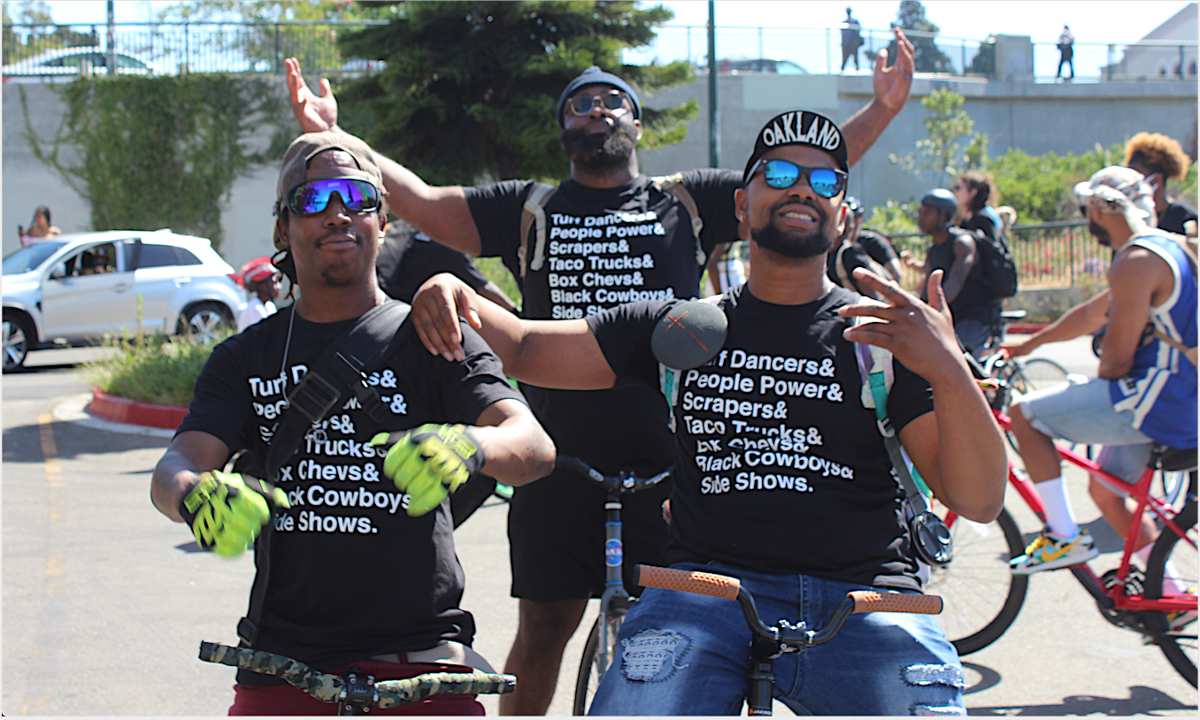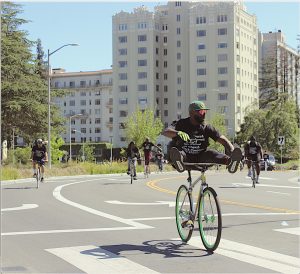Bay Area
Residents Celebrate 510 Day, an Oakland Holiday
The holiday started in 2016, when a group of long-term Oakland residents felt that, in the face of Black and Brown native Oaklanders being displaced through the city’s gentrification, a celebration of their cultures was necessary.


Demetrius Coats with his legs over his bike’s handlebars as he rides in the bike caravan around Lake Merritt at Oakland’s 510 Day celebration today.
Photo by Zack Haber on May 10.
Over 40 people gathered around Lake Merritt on Monday to celebrate 510 Day, an Oakland-based holiday that honors Black and Brown cultures of the city and their resilience against displacement each year on May 10.
“For us, it’s a protest and a party at the same time,” Leon Skyes, a Black Oakland native who helps organize 501 Day celebrations, told The Oakland Post. “Rather than being targeted, today we’re being celebrated.”
The holiday started in 2016, when a group of long-term Oakland residents felt that, in the face of Black and Brown native Oaklanders being displaced through the city’s gentrification, a celebration of their cultures was necessary. The 415 Day, a San Francisco holiday where residents gather every April 15th in Dolores Park to celebrate against and protest the removal of native SF families, was 510 Day’s inspiration. Both holidays get their name from their city’s respective telephone area codes.
In the years since the first 510 Day, several incidents at or near Lake Merritt have shown the area as a contested place where long-term Black and Brown residents’ acts of celebrating, music making, barbecuing, or simply existing have been under threat.
In the fall of 2016, a woman who lived near the lake called police on Aaron Davis, an 18-year-old Black Oakland native, to file a noise complaint about him playing his drum set. Soon after, Oaklanders rallied behind him with drums of their own to protest the complaint.
In mid-May of 2018, after a viral video showed white Oakland resident Jennifer Schulte calling police on Black Oakland resident Kenzie Smith for barbecuing near the lake, many Black Oakland residents came out to protest the incident by participating in the “BBQ’n While Black” celebration. Later that year, a white jogger threw a Black Oakland resident’s belongings in the lake. The city began evicting many Black and Brown homeless residents from the area and enforcing no camping rules in 2018 as well.
Since the start of the COVID-19 pandemic the lake has become a contested site for informal Black and Brown businesses after residents who live nearby have filed complaints against Lake Merritt vendors selling merchandise without permits.
“Gentrification has created a hostile environment for us where we can’t even just exist without getting the cops called on us,” Needa Bee, who helped start 510 Day and organize its Lake Merritt celebrations, told The Oakland Post.
Bee, also known as The Lumpia Lady, has lived in Oakland for about 30 years and has sold lumpia, a traditional Filipino food, for about 10 years at Lake Merritt. She served free lumpia to those who came to the 510 Day celebration.
The celebration included a bike and car caravan that circled the lake about one and a half times. Bikers, many of whom rode fixed gears and did tricks, lead the way. Demetrius Coleman put his legs up on his bike’s handle bars several times as he rode.
At one point, Zay Coleman sat entirely on one side of his bike, only using one pedal to move it as he biked down Grand Avenue with both his legs and his face pointing towards the lake. Cars that had signs attached to them supporting defunding the Oakland Police Department and against gentrification followed along, honked their horns loudly, and blared Oakland musicians like Too $hort. Motorcyclists rode along and revved their engines. Two roller skaters also joined the caravan.
After the caravan, participants gathered at the Lake Merritt Amphitheater to eat food and take photos while some of the bikers continued to do tricks. Neptune Jenkins stood on the frame of his bike while grabbing the front wheel, pushing and pulling it back and forth while continuing to balance. Signs honoring historical Oakland events and famous Oaklanders like basketball player Bill Russell, activists Elaine Brown, Bobby Seale, and Fred Korematsu, musician and dancer Kehlani, and rap groups Hieroglyphics and Digital Underground were lined up in a row at the amphitheater.
Nicole Lee, an Oakland native who helped organize the celebration, described 510 Day as a way to “assert joy at the same time that we’re protesting around Oakland natives and Oakland culture being displaced.”
The politics of 510 Day were present at the amphitheater, as organizers encouraged participants to sign a petition to be sent to City Council, Mayor Libby Schaaf and county and state leaders to support the #WeStillHere Oakland Platform which outlines nine demands including shelter for all and Oakland’s non-cooperation with Immigration and Customs Enforcement.
While people celebrated at the amphitheater with music and some drank alcohol and smoked cannabis, the celebration stayed calm, the crowd was not densely packed, and people left well before dark. Although in years past 510 Day in person celebrations included larger, dense crowds and live DJs spinning loud music, organizers intentionally kept this year’s in person celebrations low key as a precaution against spreading COVID-19. The organizers hosted a party on the internet later in the evening with local DJs Kleptic, AbelDee and DJ Fuze.
“While this isn’t physically the largest [510 Day celebration], this has been one of the best ones, just by the heart of the people, the will of the people, and the vibe,” Skyes told the 510 Day celebrators at the Lake Merritt amphitheater. He looks forward to hopefully returning next year with a larger in person party/protest.
Activism
Oakland Post: Week of May 28 – June 30, 2025
The printed Weekly Edition of the Oakland Post: Week of May 28 – June 3, 2025

To enlarge your view of this issue, use the slider, magnifying glass icon or full page icon in the lower right corner of the browser window.
Activism
Oakland Post: Week of May 21 – 27, 2025
The printed Weekly Edition of the Oakland Post: Week of May 21 – 27, 2025

To enlarge your view of this issue, use the slider, magnifying glass icon or full page icon in the lower right corner of the browser window.
Bay Area
Chevron Richmond Installs Baker Hughes Flare.IQ, Real-time Flare Monitoring, Control and Reduction System
While the sight of flaring can cause concern in the community, flares are essential safety systems that burn pollutants to prevent them from being released directly into the atmosphere. They activate during startup and shut-down of facility units or during upsets or equipment malfunctions. The typical flare stack is about 200 feet high so that vapors are well above street levels.

The Richmond Standard
Chevron Richmond recently installed flare.IQ, a real-time, automated system that will improve the facility’s flaring performance.
The technology, developed by Panametrics, a Baker Hughes business, uses sensors to monitor, reduce and control flaring in real time. It collects and assesses data on refinery processes, such as temperature, pressure, gas flow and gas composition, and adjusts accordingly to ensure flares burn more efficiently and cleanly, leading to fewer emissions.
“The cleaner the flare, the brighter the flame can look,” said Duy Nguyen, a Chevron Richmond flaring specialist. “If you see a brighter flame than usual on a flare, that actually means flare.IQ is operating as intended.”
While the sight of flaring can cause concern in the community, flares are essential safety systems that burn pollutants to prevent them from being released directly into the atmosphere. They activate during startup and shut-down of facility units or during upsets or equipment malfunctions. The typical flare stack is about 200 feet high so that vapors are well above street levels.
“A key element in Baker Hughes’ emissions abatement portfolio, flare.IQ has a proven track record in optimizing flare operations and significantly reducing emissions,” said Colin Hehir, vice president of Panametrics, a Baker Hughes business. “By partnering with Chevron Richmond, one of the first operators in North America to adopt flare.IQ, we are looking forward to enhancing the plant’s flaring operations.”
The installation of flare.IQ is part of a broader and ongoing effort by Chevron Richmond to improve flare performance, particularly in response to increased events after the new, more efficient hydrogen plant was brought online in 2019.
Since then, the company has invested $25 million — and counting — into flare minimization. As part of the effort, a multidisciplinary refinery team was formed to find and implement ways to improve operational reliability and ultimately reduce flaring. Operators and other employees involved in management of flares and flare gas recovery systems undergo new training.
“It is important to me that the community knows we are working hard to lower emissions and improve our flaring performance,” Nguyen said.
Also evolving is the process by which community members are notified of flaring incidents. The Community Warning System (CWS), operated by Contra Costa County is an “all-hazard” public warning system.
Residents can opt-in to receive alerts via text, e-mail and landline. The CWS was recently expanded to enable residents to receive notifications for “Level 1” incidents, which are considered informational as they do not require any community action.
For more information related to these topics, check out the resources included on the Chevron Richmond, CAER and Contra Costa Health websites. Residents are also encouraged to follow @chevronrichmond and @RFDCAOnline on Facebook and X (formerly Twitter), where additional information may be posted during an incident.
-

 Activism3 weeks ago
Activism3 weeks agoAfter Two Decades, Oakland Unified Will Finally Regain Local Control
-

 Activism3 weeks ago
Activism3 weeks agoOakland Post: Week of May 14 – 20, 2025
-

 Activism3 weeks ago
Activism3 weeks agoNew Oakland Moving Forward
-

 Alameda County3 weeks ago
Alameda County3 weeks agoOakland Begins Month-Long Closure on Largest Homeless Encampment
-

 Barbara Lee3 weeks ago
Barbara Lee3 weeks agoWNBA’s Golden State Valkyries Kick Off Season with Community Programs in Oakland
-

 Activism3 weeks ago
Activism3 weeks agoEast Bay Community Foundation’s New Grants Give Oakland’s Small Businesses a Boost
-

 Bay Area3 weeks ago
Bay Area3 weeks agoChevron Richmond Installs Baker Hughes Flare.IQ, Real-time Flare Monitoring, Control and Reduction System
-

 Bo Tefu3 weeks ago
Bo Tefu3 weeks agoGov. Newsom Highlights Record-Breaking Tourism Revenue, Warns of Economic Threats from Federal Policies














































